Dengue fever, a perilous adversary lurking in tropical and subtropical regions, has been a constant cause of concern for public health worldwide. It’s a stealthy virus, often presenting itself with symptoms that mimic other illnesses. But there are seven distinctive warning signs, like hidden clues in a mystery novel, that, when recognized, can be the key to early detection and intervention.
In this exploration, we delve deep into these 7 warning signs of dengue fever, uncovering their unique traits and significance. Each sign tells a story, offering us insights into this relentless disease. Join us on this journey of awareness and discovery as we decipher the enigma of dengue fever’s symptoms, empowering you with the knowledge to safeguard your health and that of your loved ones.
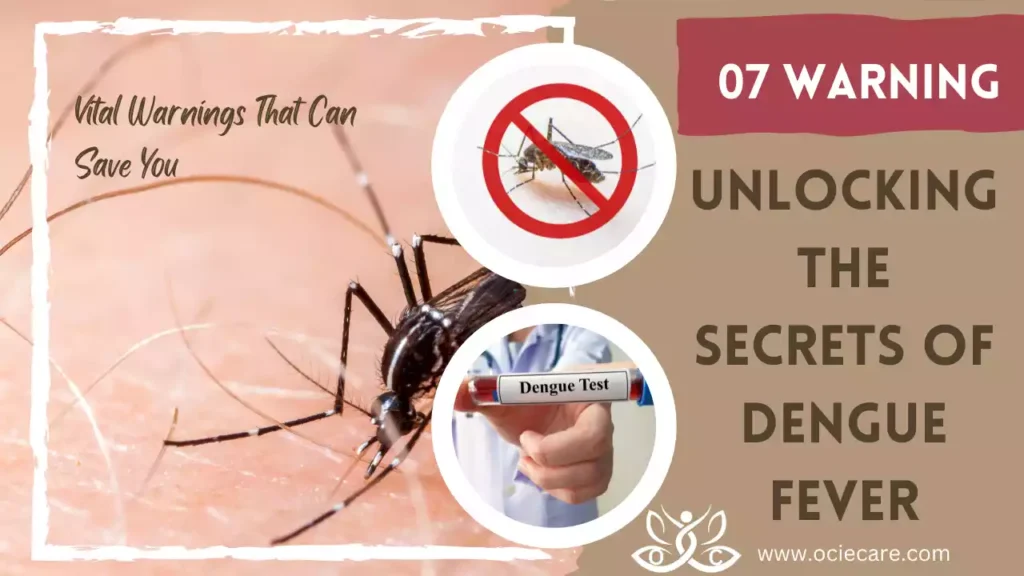
What is Dengue Fever?
Dengue fever is a mosquito-borne viral infection that affects millions of people worldwide every year. It is prevalent in tropical and subtropical regions, making it a significant public health concern. Understanding the warning signs of dengue fever is crucial for early diagnosis and prompt medical intervention.
The Role of Mosquitoes
Dengue fever is primarily transmitted to humans through the bite of infected female mosquitoes, primarily the Aedes aegypti mosquito. These mosquitoes are most active during the early morning and late afternoon, putting individuals at risk during these times.
7 Warning Signs of Dengue Fever to Watch Out For
Recognizing the symptoms of dengue fever can be challenging, as they often resemble those of other illnesses. However, here are seven warning signs that should not be ignored:
1. Sudden High Fever
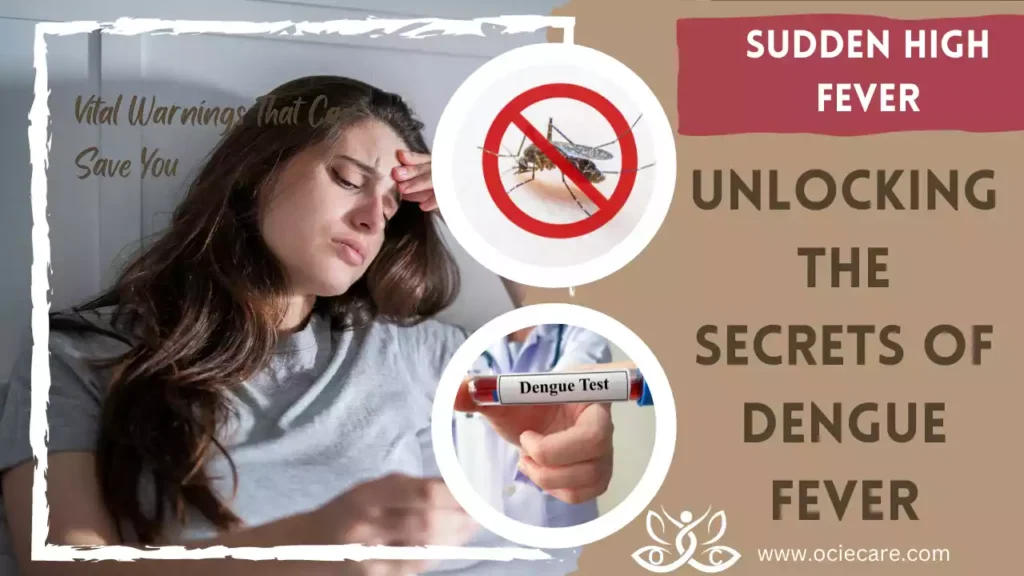
Dengue fever often begins with a dramatic onset of high fever, and this is usually the first sign that something is wrong. The fever can spike rapidly, reaching temperatures as high as 104°F (40°C). This sudden and extreme rise in body temperature can be alarming and disorienting for the person experiencing it.
A. What to Look Out For:
I. Rapid Temperature Increase:
- Dengue fever typically presents with a sudden and sharp increase in body temperature. It’s essential to have a thermometer on hand to monitor the fever accurately.
II. Fever That Persists:
- Unlike common colds or flu, where a fever might come and go, dengue fever’s high temperature tends to persist consistently for several days, often lasting around 3 to 7 days. It’s important to keep track of the fever’s duration.
B. Accompanying Symptoms:
I. Severe Headaches:
- Alongside the fever, individuals with dengue fever often experience intense headaches. These headaches can be throbbing and make it challenging to concentrate or perform daily activities.
II. Joint and Muscle Pain:
- Another common symptom that often occurs simultaneously is joint and muscle pain. This pain is often described as a deep, aching sensation and is why dengue fever is sometimes referred to as “breakbone fever.”
C. What to Do If You Suspect Dengue Fever:
I. Seek Medical Attention:
- If you or someone you know suddenly develops a high fever along with severe headaches and muscle/joint pain, it’s crucial to consult a healthcare professional promptly. Early diagnosis can make a significant difference in treatment outcomes.
II. Stay Hydrated:
- High fever can lead to dehydration. Drink plenty of fluids, such as water, oral rehydration solutions, or clear broths, to maintain proper hydration levels.
III. Rest and Pain Relief:
- Adequate rest is essential during a dengue fever episode. Over-the-counter pain relievers, such as acetaminophen (avoid non-steroidal anti-inflammatory drugs like ibuprofen), can help manage fever and alleviate headaches and body pain.
IV. Monitor Symptoms:
- Keep an eye on the fever’s progression and any other symptoms that may develop. If symptoms worsen or if there’s any sign of mild bleeding, persistent vomiting, or confusion, seek immediate medical attention.
Summary:
Remember that dengue fever can progress rapidly, so early recognition of these warning signs is crucial for timely and effective medical intervention. Additionally, taking preventive measures to avoid mosquito bites, such as using insect repellent and wearing protective clothing, can significantly reduce the risk of contracting dengue fever.
2. Severe Headaches
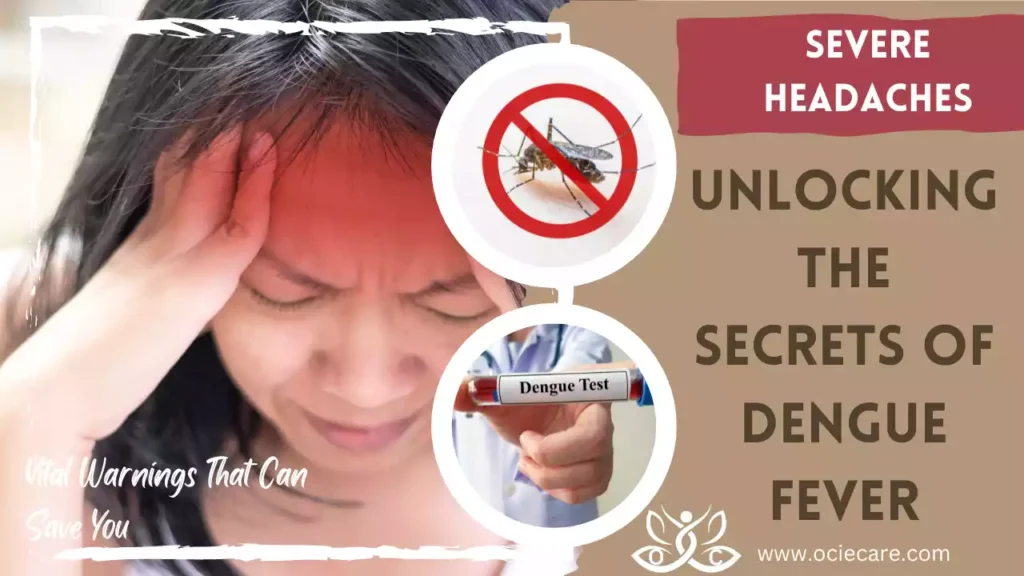
Dengue fever is often accompanied by intense and debilitating headaches. These headaches are a significant source of discomfort for individuals suffering from the disease. It’s essential to recognize the characteristics of these headaches and how they can be distinguished from other types of headaches, such as migraines or tension headaches.
A. Characteristics of Dengue-Related Headaches:
I. Intensity:
- The headaches associated with dengue fever are notably intense. They are often described as throbbing or pounding and can range from moderate to severe in intensity.
II. Duration:
- Dengue-related headaches tend to persist over an extended period. They can last for several days, making it challenging for the individual to find relief.
III. Location:
- These headaches are typically experienced all over the head, rather than being localized to a specific area. This widespread pain is a key characteristic.
B. Differentiating from Migraines and Tension Headaches:
I. Migraines:
- Migraines are often accompanied by specific symptoms such as sensitivity to light and sound, nausea, and visual disturbances (auras). In contrast, dengue-related headaches typically lack these accompanying symptoms.
II. Tension Headaches:
- Tension headaches are often described as a constant, dull ache that affects both sides of the head. While dengue headaches can be persistent, they tend to have a more throbbing and severe quality.
C. Suggestions for Managing Dengue-Related Headaches:
I. Rest and Relaxation:
- Adequate rest is essential for managing severe headaches during a dengue fever episode. Encourage the affected individual to rest in a dark, quiet room.
II. Hydration:
- Dehydration can exacerbate headaches. Ensure the person stays well-hydrated by drinking water, oral rehydration solutions, or clear broths.
III. Pain Relief:
- Over-the-counter pain relievers, such as acetaminophen (avoid non-steroidal anti-inflammatory drugs like ibuprofen), can help alleviate headache pain. Follow the recommended dosage instructions.
IV. Consult a Healthcare Professional:
- If the headache persists or worsens despite taking pain relief measures, it’s essential to consult a healthcare professional. They can assess the situation and provide appropriate medical guidance.
V. Monitor for Other Symptoms:
- Keep a close eye on other dengue-related symptoms, such as fever, joint and muscle pain, and any signs of mild bleeding or persistent vomiting. If additional concerning symptoms develop, seek immediate medical attention.
Summary:
Severe headaches are a common symptom of dengue fever and can be particularly distressing. Recognizing their intensity, duration, and location, as well as distinguishing them from other types of headaches, is crucial for proper management. Early intervention, along with rest, hydration, and pain relief, can help alleviate the discomfort associated with dengue-related headaches.
3. Pain Behind the Eyes
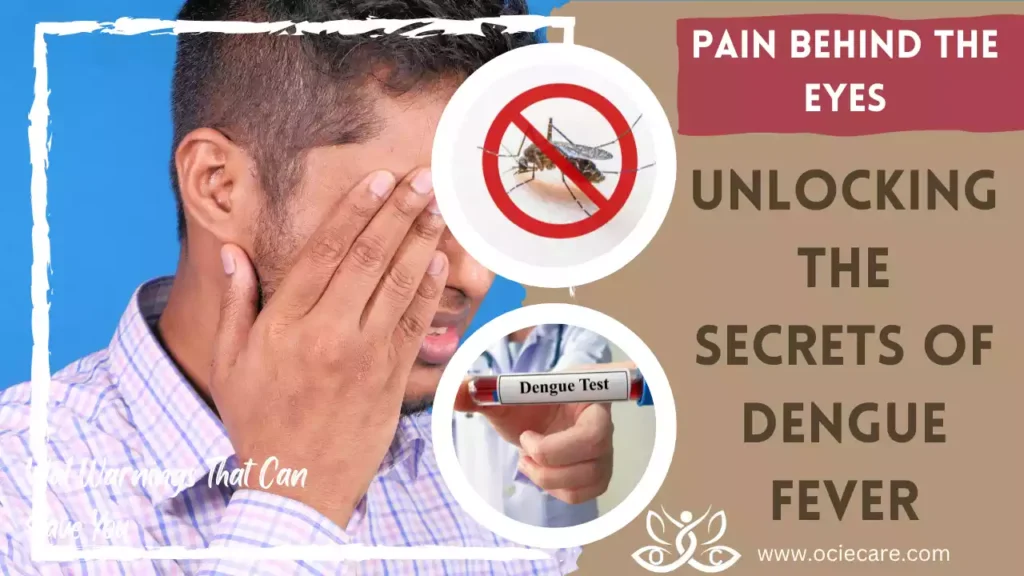
Pain behind the eyes is a distinctive symptom of dengue fever, and it can be excruciating for those affected. Understanding this symptom’s characteristics and how to manage it is essential for individuals who suspect they may have dengue.
A. Characteristics of Eye Pain in Dengue Fever:
I. Deep, Aching Pain:
- The pain behind the eyes associated with dengue fever is often described as a deep, aching sensation. It can feel as if the eyes themselves are sore or under pressure.
II. Bilateral:
- This symptom usually affects both eyes simultaneously. It’s important to note that eye pain in only one eye may indicate a different medical issue and should be promptly evaluated by a healthcare professional.
III. Intensity:
- The pain can vary in intensity but is generally quite severe. It can interfere with normal activities and may worsen with eye movement.
B. Suggestions for Managing Eye Pain in Dengue Fever:
I. Rest Your Eyes:
- Whenever possible, rest your eyes in a quiet, dimly lit room. Reducing exposure to bright lights and screens can help alleviate eye discomfort.
II. Apply a Cold Compress:
- Placing a cold compress over closed eyelids can provide relief from eye pain. Use a clean cloth or an eye mask chilled in the refrigerator for a soothing effect.
III. Stay Hydrated:
- Dehydration can exacerbate eye pain and other dengue-related symptoms. Ensure you are drinking enough fluids to maintain proper hydration.
IV. Over-the-Counter Pain Relievers:
- Non-prescription pain relievers like acetaminophen can help alleviate the pain behind the eyes. Always follow the recommended dosage instructions.
V. Avoid Eye Strain:
- Minimize activities that require prolonged eye focus, such as reading or using screens. Give your eyes frequent breaks.
VI. Consult a Healthcare Professional:
- If the eye pain is severe, persists, or is accompanied by other concerning symptoms, it is crucial to seek medical attention promptly. An eye examination can rule out other potential causes of eye discomfort.
C. When to Seek Immediate Medical Attention:
- If eye pain is severe and not responsive to over-the-counter pain relievers.
- If there is any change in vision, such as blurriness or sensitivity to light.
- If eye redness or swelling accompanies the pain.
- If additional severe symptoms like persistent vomiting, bleeding, or confusion develop.
Summary:
Pain behind the eyes is a distinctive symptom of dengue fever, often described as a deep, aching sensation. While it can be excruciating, there are measures individuals can take to alleviate this discomfort. Rest, hydration, cold compresses, and over-the-counter pain relievers can provide relief, but it’s essential to monitor the symptoms closely and seek immediate medical attention if necessary, especially if other severe symptoms emerge.
4. Joint and Muscle Pain
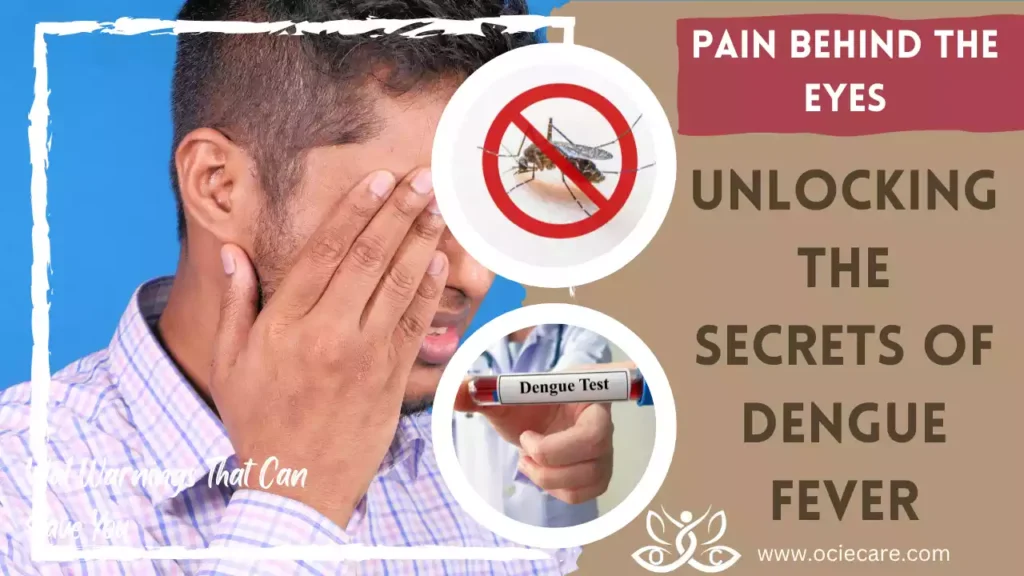
Joint and muscle pain are hallmark symptoms of dengue fever, and they can be extremely distressing. This symptom is often described as “breakbone fever” due to the intensity of the discomfort.
A. Characteristics of Joint and Muscle Pain:
I. Widespread Pain:
- The pain is not limited to a specific joint or muscle group; it can affect various parts of the body simultaneously. This widespread discomfort can make even simple movements painful.
II. Severity:
- Dengue-related joint and muscle pain can be severe, leading to significant mobility limitations. Individuals may find it challenging to perform routine activities.
III. Duration:
- This pain can persist for several days and may coincide with other dengue symptoms, such as fever and headaches.
B. Suggestions for Managing Joint and Muscle Pain:
I. Rest:
- Rest is crucial when experiencing joint and muscle pain. Avoid strenuous physical activities that can worsen the discomfort.
II. Hydration:
- Dehydration can exacerbate muscle pain. Ensure you are adequately hydrated by drinking water, oral rehydration solutions, or clear broths.
III. Pain Relief:
- Over-the-counter pain relievers like acetaminophen can help alleviate joint and muscle pain. Always follow the recommended dosage instructions.
IV. Gentle Stretching:
- Gentle stretching exercises can provide some relief from muscle pain. Consult a healthcare professional or physiotherapist for appropriate stretches.
V. Warm Compress:
- Applying a warm compress to sore areas can help relax muscles and alleviate pain. Make sure it’s not too hot to avoid burns.
VI. Consult a Healthcare Professional:
- If the pain is severe, persistent, or accompanied by other concerning symptoms, consult a healthcare provider. They can assess your condition and recommend appropriate treatments.
5. Skin Rash
A skin rash is another common symptom of dengue fever and typically appears a few days after the onset of fever. It’s essential to recognize this rash and distinguish it from other skin conditions.
A. Characteristics of the Dengue Skin Rash:
I. Appearance:
- The rash often presents as small, red, and flat spots or raised bumps. It can appear on various parts of the body, including the arms, legs, chest, and face.
II. Timing:
- The rash typically emerges around the same time as the fever and can last for several days.
III. Itching:
- The rash may or may not be itchy. Some individuals experience itching, while others do not.
B. Suggestions for Managing the Dengue Skin Rash:
I. Keep the Skin Clean:
- Gently wash the affected areas with mild soap and water. Avoid harsh or scented skincare products.
II. Avoid Scratching:
- If the rash itches, try to resist scratching to prevent skin damage and infection.
III. Loose Clothing:
- Wear loose-fitting, breathable clothing to minimize irritation to the rash.
IV. Stay Hydrated:
- Adequate hydration is essential for overall well-being and can help the skin heal.
V. Consult a Healthcare Professional:
- If the rash is extensive, painful, or accompanied by other concerning symptoms, seek medical advice.
Summary:
Joint and muscle pain, as well as skin rashes, are common warning signs of dengue fever. These symptoms can be particularly uncomfortable but can often be managed with rest, hydration, over-the-counter pain relievers, and proper skin care. However, it’s vital to monitor these symptoms closely and seek medical attention if they worsen or are accompanied by severe or unusual symptoms.
6. Mild Bleeding
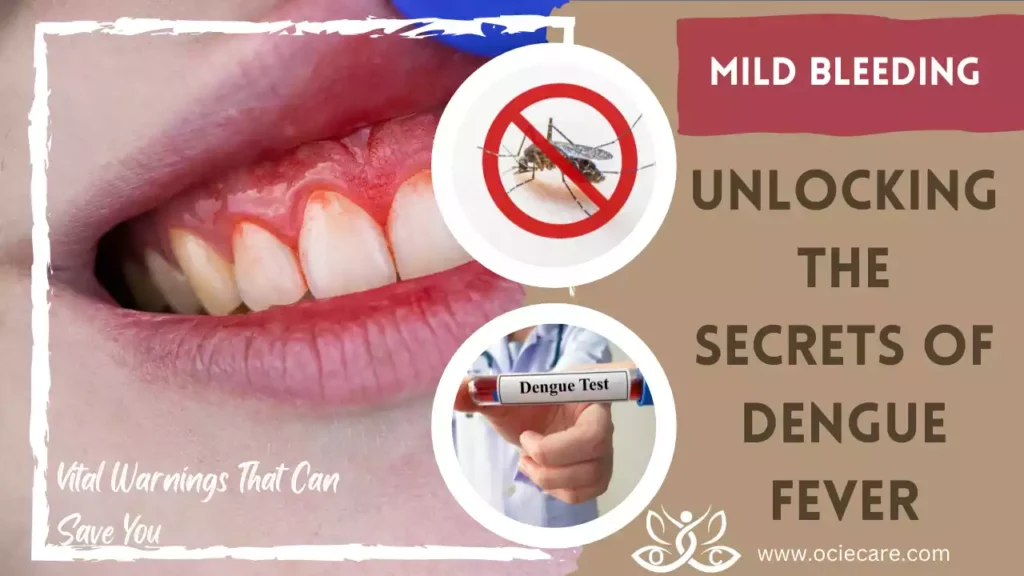
Mild bleeding is a concerning symptom associated with dengue fever, and it can manifest in various ways, such as nosebleeds, gum bleeding, or easy bruising. Recognizing this symptom and taking prompt action is crucial for the well-being of individuals with dengue fever.
A. Types of Mild Bleeding in Dengue Fever:
I. Nosebleeds:
- Nosebleeds, also known as epistaxis, are a common form of mild bleeding in dengue cases. They can occur spontaneously or due to minor trauma to the nasal passages.
II. Gum Bleeding:
- Bleeding from the gums, often noticed while brushing teeth or eating, is another manifestation of mild bleeding associated with dengue fever.
III. Easy Bruising:
- Individuals with dengue may experience easy bruising, where even minor bumps or pressure on the skin can result in bruise formation.
B. Why Mild Bleeding is a Concern:
- Mild bleeding is a warning sign in dengue fever because it may indicate a drop in platelet count, a condition known as thrombocytopenia. Platelets are crucial for blood clotting, and a decrease in their numbers can lead to bleeding tendencies. Severe thrombocytopenia can be life-threatening.
C. Suggestions for Managing Mild Bleeding in Dengue Fever:
I. Seek Immediate Medical Attention:
- If you or someone you know with dengue fever experiences any form of mild bleeding, it is imperative to seek medical help promptly. Early diagnosis and treatment are crucial to prevent complications.
II. Avoid Aspirin and NSAIDs:
- Do not take aspirin or non-steroidal anti-inflammatory drugs (NSAIDs) like ibuprofen if you suspect dengue fever and are experiencing bleeding symptoms, as these medications can exacerbate bleeding tendencies. Consult a healthcare provider for appropriate pain relief options.
III. Stay Hydrated:
- Adequate hydration can help maintain blood volume and circulation. Drink fluids like water, oral rehydration solutions, or clear broths to prevent dehydration.
IV. Avoid Trauma:
- Be cautious to avoid any activities or situations that could lead to physical trauma, as individuals with dengue fever are more susceptible to bleeding due to reduced platelet levels.
V. Frequent Monitoring:
- If bleeding symptoms persist or worsen, medical professionals may monitor your platelet count and hematocrit levels closely. Depending on the severity, they may recommend platelet transfusions.
VI. Rest and Minimize Physical Exertion:
- Resting and minimizing physical activity can help prevent further strain on the body and reduce the risk of injury or bleeding.
VII. Monitor for Additional Symptoms:
- Keep a lookout for other concerning symptoms, such as persistent vomiting, abdominal pain, or confusion, as these may indicate a more severe form of dengue that requires immediate attention.
Summary:
Mild bleeding is a serious symptom associated with dengue fever that should never be ignored. If you or someone you know experiences any form of mild bleeding along with other dengue-related symptoms, such as fever and joint pain, seek immediate medical attention. Early diagnosis, monitoring, and appropriate medical care can make a significant difference in managing and recovering from dengue fever.
7. Persistent Vomiting
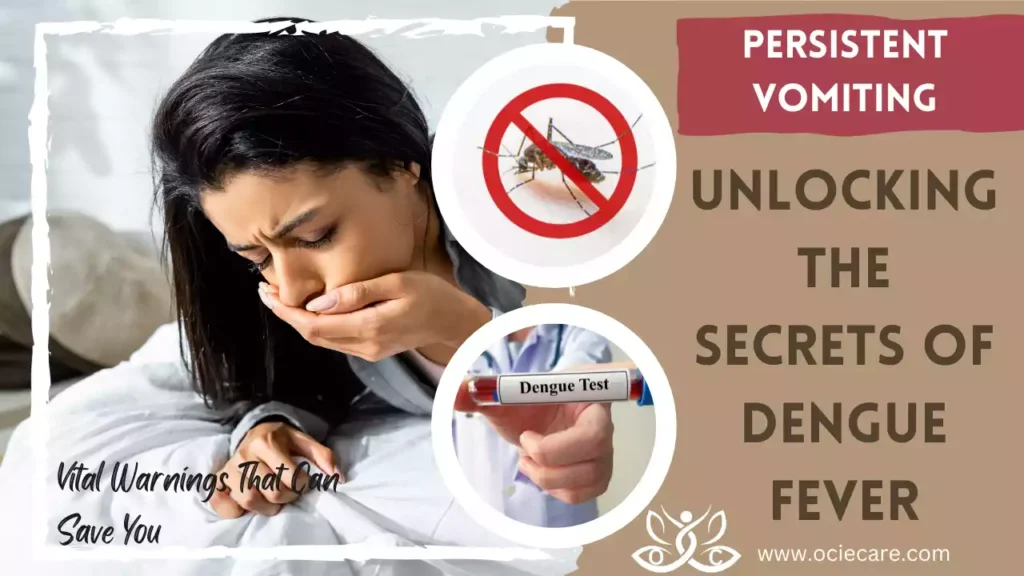
Persistent vomiting and nausea are concerning symptoms associated with dengue fever. They can lead to dehydration and worsen the overall health of individuals with the disease. Recognizing and managing these symptoms is crucial for a positive outcome.
A. Characteristics of Persistent Vomiting in Dengue Fever:
I. Frequency:
- Vomiting in dengue fever can be frequent and persistent, occurring several times within a short period.
II. Nausea:
- Nausea, a feeling of queasiness or an urge to vomit, often accompanies vomiting in dengue cases.
III. Risk of Dehydration:
- Prolonged vomiting can lead to rapid dehydration, especially in hot and humid climates where dengue is prevalent.
B. Suggestions for Managing Persistent Vomiting in Dengue Fever:
I. Seek Immediate Medical Attention:
- If you or someone you know with dengue fever experiences persistent vomiting, it is crucial to seek medical help promptly. Dehydration can become severe and life-threatening.
II. Stay Hydrated:
- If you can tolerate fluids without vomiting, sip on clear fluids like water, oral rehydration solutions (ORS), ginger tea, or ice chips in small, frequent amounts. ORS is particularly effective in replenishing lost electrolytes.
III. Ice Chips:
- Sucking on ice chips or ice pops can help soothe nausea and provide hydration if drinking fluids is challenging.
IV. Avoid Solid Foods:
- Steer clear of solid foods until vomiting subsides. When ready to resume eating, start with bland, easy-to-digest foods like plain rice, crackers, or toast.
V. Rest:
- Resting in a cool, quiet environment can help alleviate nausea and vomiting. Lie down with your head elevated if possible.
VI. Medications:
- Consult a healthcare provider before taking any anti-nausea medications, as some may worsen dengue symptoms or interact with other treatments.
VII. Oral Hygiene:
- Gently rinse your mouth with water or an alcohol-free mouthwash to freshen your mouth and reduce the sensation of nausea.
VIII. Monitor for Dehydration:
- Watch for signs of dehydration, including dry mouth, dark urine, dizziness, or reduced urination. Dehydration can escalate rapidly, so prompt action is essential.
IX. Regular Follow-Up:
- If vomiting persists or worsens despite your efforts to manage it, consult a healthcare professional for further evaluation and treatment.
X. Avoid Self-Medication:
- Do not self-prescribe over-the-counter anti-vomiting medications without consulting a healthcare provider, as these can have side effects and may not be suitable for dengue patients.
Summary:
Persistent vomiting and nausea are warning signs of dengue fever that should not be taken lightly. Immediate medical attention is crucial to address dehydration and ensure proper management of dengue symptoms. Hydration, rest, and careful monitoring are essential during this period. If symptoms worsen or if other concerning symptoms develop, seek medical assistance promptly for a thorough evaluation and treatment plan.
Resources for Dengue Fever
Here are some reputable resources for information on dengue fever:
1. World Health Organization (WHO) – Dengue and Severe Dengue
Website: WHO Dengue Information
The WHO provides comprehensive information on dengue fever, including its global impact, prevention, and control measures.
2. Centers for Disease Control and Prevention (CDC) – Dengue
Website: CDC Dengue Information
The CDC offers a wealth of resources on dengue fever, including guidance for travelers, prevention tips, and information on dengue in the United States.
3. National Institute of Allergy and Infectious Diseases (NIAID) – Dengue Fever
Website: NIAID Dengue Fever
NIAID provides in-depth research and resources related to dengue fever, including clinical trials and studies.
4. MedlinePlus – Dengue Fever
Website: MedlinePlus Dengue Fever
MedlinePlus offers consumer-friendly information on dengue fever, its symptoms, treatment, and prevention.
5. Healthline – Dengue Fever
Website: Healthline Dengue Fever
Healthline provides articles on dengue fever, its symptoms, causes, treatment options, and prevention strategies.
6. Mayo Clinic – Dengue Fever
Website: Mayo Clinic Dengue Fever
Mayo Clinic offers expert insights into dengue fever, its symptoms, diagnosis, and treatment.
7. Pan American Health Organization (PAHO) – Dengue
Website: PAHO Dengue Information
PAHO provides information on dengue prevention and control in the Americas.
These resources can help you access accurate and up-to-date information about dengue fever, its symptoms, prevention, and treatment options. Always consult healthcare professionals for personalized advice and guidance regarding any medical concerns.
Overall Conclusion on 7 Warning Signs of Dengue Fever
In conclusion, the articles and resources on the “7 Warning Signs of Dengue Fever” provide a comprehensive understanding of this mosquito-borne viral infection. Dengue fever is a significant public health concern, particularly in tropical and subtropical regions, and recognizing its warning signs is crucial for early diagnosis and prompt medical intervention.
The warning signs discussed in these articles include:
Sudden High Fever: Dengue often begins with a rapid and high fever accompanied by severe headaches and joint and muscle pain.
Severe Headaches: Intense and debilitating headaches are common in dengue cases and can be confused with other types of headaches.
Pain Behind the Eyes: Dengue can cause excruciating pain behind the eyes, described as a deep, aching sensation.
Joint and Muscle Pain: Patients frequently experience severe joint and muscle pain, leading to the term “breakbone fever.”
Skin Rash: A rash, often small, red spots or raised bumps, can appear a few days after the onset of fever.
Mild Bleeding: Dengue fever can lead to mild bleeding, such as nosebleeds, gum bleeding, or easy bruising, indicating a drop in platelet count.
Persistent Vomiting: Severe vomiting and nausea can lead to dehydration rapidly, emphasizing the need to stay hydrated when experiencing these symptoms.
These resources, including information from reputable organizations like the World Health Organization (WHO) and the Centers for Disease Control and Prevention (CDC), offer valuable insights into dengue fever’s symptoms, causes, prevention, and management. They stress the importance of seeking immediate medical attention if any of these warning signs are present, as early diagnosis and treatment significantly improve the outcome for individuals with dengue fever.
Understanding the warning signs and accessing these resources is essential for raising awareness about dengue fever, promoting prevention measures, and ultimately reducing the impact of this disease on global public health.
FAQs
Q. What is dengue fever, and where is it prevalent?
A. Dengue fever is a mosquito-borne viral infection that affects millions of people worldwide. It is prevalent in tropical and subtropical regions, including parts of Asia, the Americas, Africa, and the Pacific Islands.
Q. How is dengue fever transmitted?
A. Dengue fever is primarily transmitted to humans through the bite of infected female mosquitoes, particularly the Aedes aegypti mosquito.
Q. What are the common symptoms of dengue fever?
A. Common symptoms include sudden high fever, severe headaches, pain behind the eyes, joint and muscle pain, skin rash, mild bleeding (like nosebleeds or gum bleeding), and persistent vomiting.
Q. Why is recognizing the warning signs of dengue fever essential?
A. Early recognition of these warning signs is crucial for early diagnosis and prompt medical intervention. Timely treatment can significantly improve the outcome of dengue fever.
Q. Are dengue symptoms similar to those of other illnesses?
A. Yes, dengue symptoms can resemble those of other illnesses, making it essential to be aware of the specific warning signs associated with dengue fever.
Q. How can I manage the symptoms of dengue fever at home?
A. While there is no specific antiviral treatment for dengue fever, you can manage symptoms through rest, hydration, pain relief (acetaminophen, not aspirin or NSAIDs), and proper care of skin rashes. However, consult a healthcare professional for guidance.
Q. When should I seek immediate medical attention if I suspect dengue fever?
A. If you or someone you know experiences any of the warning signs of dengue fever, such as severe persistent vomiting, bleeding, confusion, or worsening symptoms, seek medical help immediately. Early diagnosis and treatment are crucial for better outcomes.
You may also like to Know:
Diet Plan Health Self Care Weight loss Weight Gain
Affiliate Disclosure:
This page contains affiliate products. When you click on links to purchase products, we may earn a commission at no additional cost to you. Your support helps us continue providing valuable content. Thank you for your understanding and trust in our recommendations.
The author’s expertise and attention to detail were truly impressive. I felt truly informed after reading this. | Prefabrik Zonguldak
It was both fun and informative, thanks!
Bu yazıyı okuduktan sonra kendimi daha motive hissediyorum. Yazarın cesaret verici ve ilham verici sözleri gerçekten içime işledi. | Gemlik toptan giyim
Yazarın samimi ve içten üslubu gerçekten içime dokundu. İçeriğin derinlikleri beni düşündürdü ve yeni bakış açıları kazanmama yardımcı oldu. | Beykoz Sandalye Yıkama
Your blog never fails to educate and inspire. Thank you for that! | Messy Bob Haircut Ideas for the Ultimate Boho Vibe
CSS scroll-margin-bottom Özelliği Nedir? | Reading MAFA’s articles is like embarking on a thrilling adventure through the uncharted territories of web design innovation.
Bucak / Burdur Toptan Kadın Giyim | RENE Toptan Tekstil ve Giyim Çözümleri’nin ürünleri gerçekten dayanıklı ve kaliteli. Uzun süre kullanabileceğiniz ürünler arıyorsanız doğru adrestesiniz.
Web Yazılım Nasıl Yapılır? | MAFA’s insights into web design and development offer fresh perspectives on familiar topics. Thank you for the new insights.
Bozüyük / Bilecik | EVKON’un prefabrik çözümleri gerçekten çevre dostu. Sürdürülebilir malzemeler kullanmaları takdire şayan.
Kullanıcı Deneyimine Giriş | Yazılarınızı okuduktan sonra, web tasarımı ve yazılım dünyasındaki kendi projelerimi daha özgüvenle yönetebiliyorum. Sizin gibi bir kaynağa sahip olduğum için gerçekten şanslıyım.
Marka Sadakati Nedir? | Yazılarınızı okuduktan sonra, web tasarımı ve yazılım dünyasındaki kendi projelerimi daha özgüvenle yönetebiliyorum. Sizin gibi bir kaynağa sahip olduğum için gerçekten şanslıyım.
Hanönü Toptan Giyim | After starting to use products from RENE Wholesale Textile and Clothing Solutions, I decided not to shop anywhere else. Their quality really impressed me.
Çavuşoğlu Beton Kırma | Rüzgar Karot’un profesyonel yaklaşımı ve hızlı geri dönüşleri işlerimi çok kolaylaştırdı, teşekkürler!
Perşembe / Ordu Toptan Kadın Giyim | Shopping at RENE Wholesale Textile and Clothing Solutions is always a pleasant experience. Their product quality and service are commendable.
Besni Toptan Tekstil | RENE Wholesale Textile and Clothing Solutions’ product range is impressively diverse. You can find products to suit any style or need.
Siyah Bisiklet Yaka Fermuarlı Poliamid Kaşkorse Kısa kollu Crop Body | Your content is truly top-notch and original. Following you is a delight.
How to do Mınd Diet? | Your writing has a way of resonating with me on a deep level. Thank you for sharing your insights.
Gülşehir Jakuzi | Atlas Jakuzi’nin ürünleriyle her gün biraz lüks yaşamak mümkün. Bu yazı, bu deneyimi daha yakından tanımama yardımcı oldu.
Kars Prefabrik Yapı | EVKON’s prefab structures are affordable and quality-driven. Their ability to maintain this balance is impressive.
Bayrampaşa, İstanbul Jakuzi | Atlas Jakuzi’nin ürünleriyle evimde kendime özel bir alan yaratmak mümkün. Bu yazı, bu konuda çok değerli bilgiler içeriyor.
How to Get Fluffy Hair: Useful Tips and Tricks | Your passion for your craft is evident in every word you write. Thank you for sharing your expertise with us.
SEO Leeuwarden | MAFA’s passie voor webdesign en softwareontwikkeling is duidelijk te zien in hun werk. Ik kijk ernaar uit om met hen samen te werken aan mijn volgende project.
Bitdefender | I trust MAFA Technology to provide trustworthy information about tech trends.
Evliya Çelebi Mahallesi, Tuzla Koltuk Yıkama | PENTA’nın sunduğu yıkama çözümleri, işletmemiz için gerçekten hayat kurtarıcı oldu. Teşekkürler!
Patnos / Ağrı Toptan Kadın Giyim | RENE Toptan Tekstil ve Giyim Çözümleri’nin ürünleri gerçekten dayanıklı ve kaliteli. Uzun süre kullanabileceğiniz ürünler arıyorsanız doğru adrestesiniz.
Seyrantepe / Kağıthane Beton Kesme | Rüzgar Karot’s quality materials and experienced team ensure tasks are handled with confidence.
Wat is Formaatgreep? | Great blog! MAFA’s expertise in web design and software development is truly remarkable.
LINC Nedir? | I’ve bookmarked this blog post for future reference because the information shared here is too valuable to forget.
Yunak, Konya Jakuzi Modelleri | Atlas Jakuzi’nin sunduğu ürünlerle evimde bir lüks oteldeymiş gibi hissediyorum. Harika bir deneyim!
Derince Yangın Söndürme Sistemleri | MAFA Technology delivers tech news in a timely and reliable manner.
Adilcevaz / Bitlis Toptan Kadın Giyim | RENE Toptan Tekstil ve Giyim Çözümleri’nin ürünleri gerçekten dayanıklı ve kaliteli. Uzun süre kullanabileceğiniz ürünler arıyorsanız doğru adrestesiniz.
What is Mortgage Insurance | Your vulnerability is a strength. Thank you for sharing your journey with us.
Greatest Long Pixie Cuts for Thin Hair to Look Voluminous | Your authenticity is what sets your blog apart. Thank you for being genuine.
Wat is Onedrive? | MAFA’s Ruf im Bereich Webdesign und Softwareentwicklung spricht für sich. Ich kann es kaum erwarten, mit ihnen an meinem nächsten Projekt zu arbeiten.
Edirne’nin Osmanlı Mimarisine Yolculuk | After reading MAFA’s articles, I feel more confident in my abilities as a web designer and developer. Thank you for the reassurance.
Bilecik Zip Perde Fiyatları | Bu makalede Zip Perde’nin ev güvenliği açısından sunduğu avantajlar hakkında bilgi almak çok değerliydi. Venster Systems’in güvenlik odaklı çözümlerine olan bağlılığınızı takdir ediyorum.
We’re impressed by the attention to detail with Venster Systems’ pleated insect screens. It’s evident that they prioritize quality. | Adıyaman Sineklik Çeşitleri
Wat is Digitaal? | Deze blog heeft me echt geholpen meer te begrijpen over de innovatieve aanpak van MAFA in webdesign en softwareontwikkeling. Ik ben onder de indruk van hun werk.
Venster Systems’in pileli sineklikleriyle yaz aylarında keyifli bir şekilde balkonda vakit geçirebiliyoruz, sinekler artık sorun olmaktan çıktı. | Sineklik Modelleri Afyon
Cauliflower Gratin Recipes | I appreciate the effort you put into crafting each post. It truly shows in the quality of your content.
Reşadiye Beton Kesme | Rüzgar Karot’un müşteri memnuniyeti odaklı yaklaşımı ve etkili iletişimi işlerimizi çok kolaylaştırdı.
Bu plise perdeler, sadece dekorasyon için değil aynı zamanda pratiklik için de mükemmel bir seçenek. Çok memnunuz! | Erzurum Jaluzi Perde Fiyatları
Çekmeköy | Venster Systems’in plise sineklikleri sayesinde balkonda oturmak artık daha keyifli. Sineklerle uğraşmak zorunda değiliz.
Malatya Sineklik Modelleri | I appreciate the attention to detail in Venster Systems’ blinds – every aspect feels carefully considered.
Eastern European Recipes | Your writing is a testament to the power of resilience, showing us that even in our darkest moments, there is light to be found.
Zip Perde Sistemleri Bingöl | These pleated blinds are not only stylish but also incredibly durable. Venster Systems has truly delivered on quality!
Kurtköy Güvenlik Alarm Sistemleri | MAFA Technology’s analysis adds depth to my understanding of tech issues.
This post is so well-written. It’s clear that you put a lot of thought into it.
Thanks
Thanks for sharing. I read many of your blog posts, cool, your blog is very good.
very efficient and was easy process, thank you for the services
I’m really impressed with your website and this post in particular. It’s evident that you have a deep understanding of the subject and have presented it in an easily digestible manner. Great job!
I’m really impressed with your website and this post in particular. It’s evident that you have a deep understanding of the subject and have presented it in an easily digestible manner. Great job!
I don’t think the title of your article matches the content lol. Just kidding, mainly because I had some doubts after reading the article.